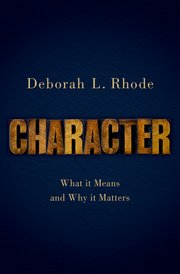2018 School Spending Survey Report
Character: What It Means and Why it Matters
COPY ISBN
VERDICT Recommended for academic libraries and readers interested in legal ethics.
RELATED
ALREADY A SUBSCRIBER? LOG IN
We are currently offering this content for free. Sign up now to activate your personal profile, where you can save articles for future viewing




Comment Policy:
Comment should not be empty !!!